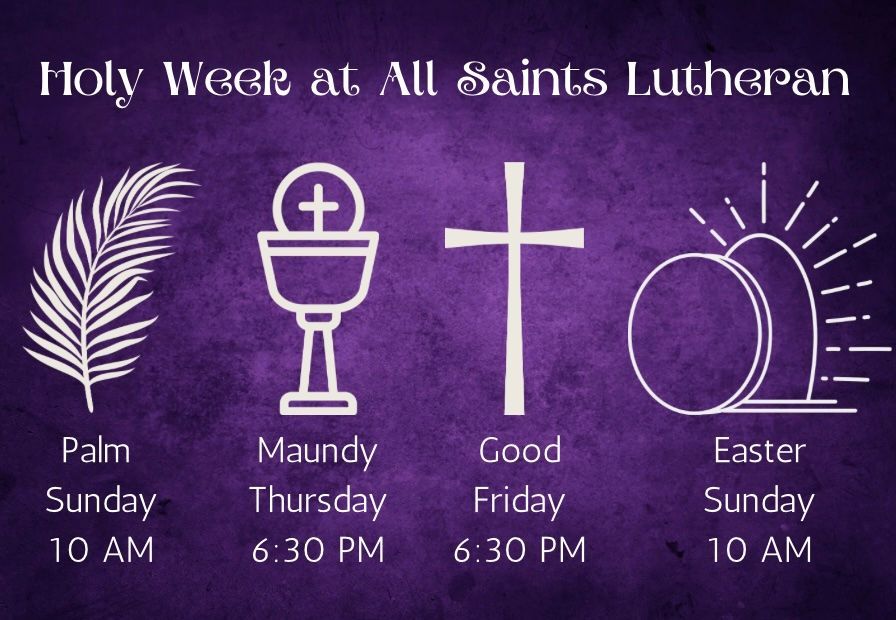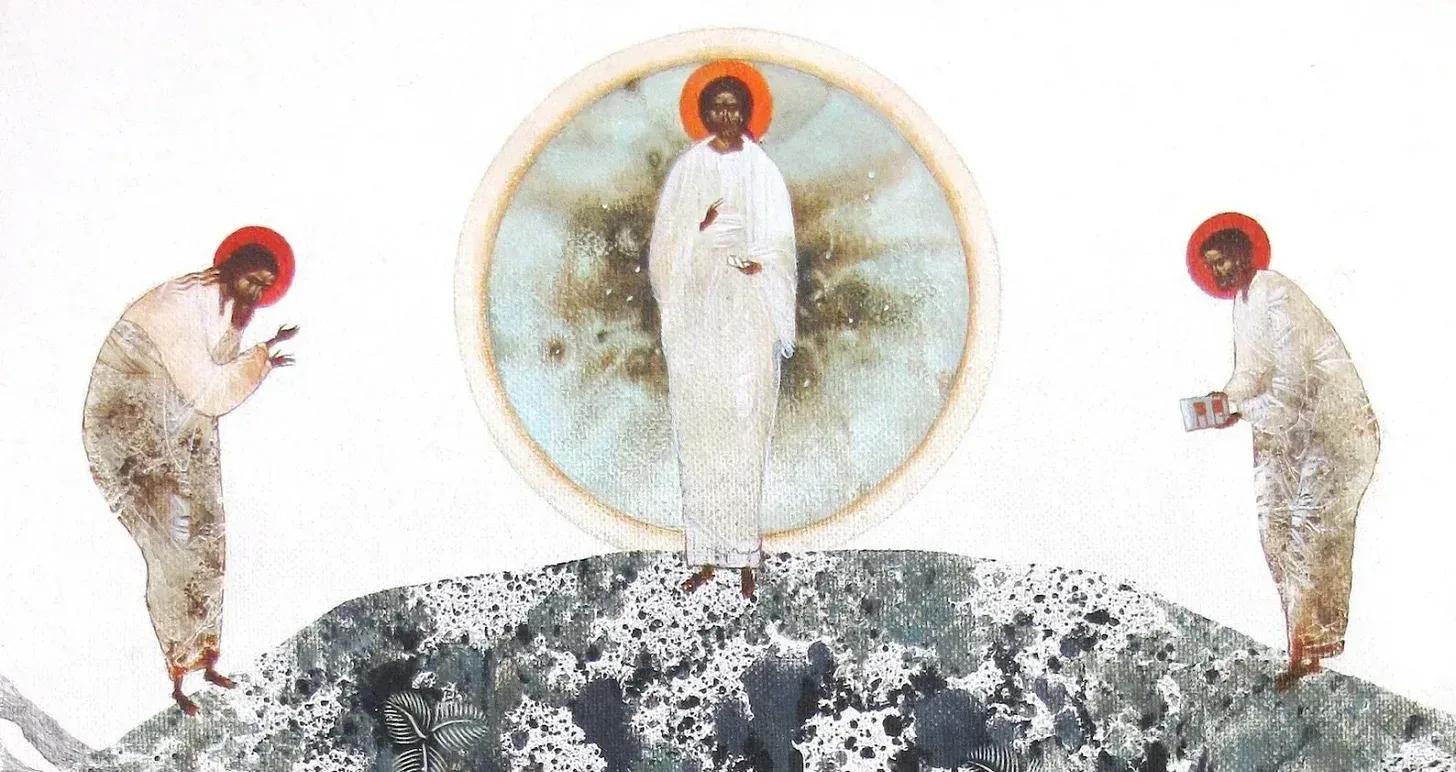Second Sunday of Lent, March 16, 2025
Earlier this week,
I received a call from my brother.
He had a couple of questions
about our father’s estate
and the beginning of the probate process.
In the course of our other small talk,
he asked me,
“So, what did you give up for Lent?”
I was shocked.
I hadn’t even given the idea a passing thought.
In all I had had
going on in the lead up to Ash Wednesday and Lent,
I had not so much as considered
what discipline I might undertake
in this season of reflection and renewal.
After a flabbergasted silence,
I said,
“Absolutely nothing.”
He chuckled and said,
“That makes sense.”
But the question stuck with me.
What did I give up?
I’ve been closer to just giving up.
I thought to myself.
And I am not alone.
I have had a number of conversations,
in hushed tones,
before or after Bible Study
or Christian Conversations,
even during the Fish Fry on Friday,
where people have shared with me
their anxiety, fear, despair,
hopelessness, restlessness;
their palpable anger and staggering helplessness
regarding the current political climate,
about how their neighbors are terrified to leave their homes,
about how the ministries they support
are being defunded and their clients targeted,
about how churches are declining
and animosity among neighbors is on the rise.
There is a pervasive
and nearly tangible
sense of dread all around us,
and it is difficult to maintain a sense of hope,
to remain grounded in the kingdom of God,
to display the resilience of a people of faith.
As the gap widens
between the world God has promised
and the world we are living in,
we would be fools not to ask,
What is taking so long?
Abram asks God
much the same question.
“What will you give me?”
he asks in response to God’s promise
to defend and reward him.
“Prove it,”
says Abram.
“At the moment,
I have no children.
How can this promise
possibly be true?”
God responds to Abram’s question
with a second promise
to make his descendants as numerous
as the stars in the sky,
and God counts Abram’s trust
as righteousness.
So God asks for a sacrifice,
a sign and seal,
a sacrament;
an action that does what it says
and says what it does.
Abram sacrificed livestock
and waited on the Lord.
And in this waiting,
he is exhausted
and overcome by a terrifying darkness.
Paul advises the Philippians
that despite many living as enemies
of the cross of Christ,
all appetite and revelry,
with their minds set
on only what they can see
right in front of them—
despite this,
these imitators of Paul
and followers of Jesus
are citizens of another nation,
members of a commonwealth,
an independent state within the empire.
The state of the world is what it is,
and the duty of the followers of Jesus
is to stand firm,
to wait for the Savior
who will transform their humiliation
into vindication.
But our question remains;
What is taking so long?
It has been some 2000 years
since Paul wrote these words
to the church a Phillipi,
and only God knows how long it has been
since God spoke these words to Abram.
The psalmist believed
that he would see these promises
in the land of the living—
that is,
in his lifetime.
I am not sure I share his confidence.
In the Gospel of Luke,
Jesus seems to be doing some waiting of his own.
Warned by some Pharisees
that Herod wants to kill him,
Jesus speaks in parable
about his death and resurrection,
dismissing their concern
and Herod’s authority.
“Tell that old fox
that I will doing what I came to do,”
Jesus tells the anxious Pharisees,
“and I’ll be doing it in his backyard.
I came to die
and it could only happen in Jerusalem.
“O Jerusalem,
How I have longed to gather you up
like a mother hen.
But you were too busy watching the fox.
“You weren’t content with the wings of a hen,
and you preferred the wings of Caesar’s eagle.”
Like the good people of Jerusalem,
we tend to get ourselves in trouble
while we are waiting on the Lord.
We think this waiting is passive,
inactive,
boring.
In our boredom,
we begin to doubt God
is going to keep these promises,
and we begin to listen to the fox,
and we begin to prefer the eagle.
In our boredom and disbelief,
we destroy ourselves and each other,
we begin to worship our appetites,
we begin to wallow in our shame,
and we begin to focus on only what we can see
right in front of us.
We begin to live,
as Paul says,
as enemies of the cross.
But God is not waiting to keep these promises,
nor is waiting on the Lord
a passive, boring endeavor.
God counted Abram’s faith as righteousness
and called him to sacrifice.
Paul tells the Philippians
that while we await a savior,
we already have our salvation—
liberation from wanton consumption
and self-abasement,
and we have a new citizenship
in the Commonwealth of God.
And Jesus is about his work
despite the distraction and desertion
of Jerusalem.
God shows us what it means
to wait on the Lord
by waiting on us.
God showed up for Abram
in his deep and terrifying darkness.
The savior we await
does not prevent our humiliation,
but transforms it into God’s own glory.
God has heard our cries
from this deep and terrifying darkness,
and God is wondering
what is taking so long?
God is wondering
when we will begin the sacrifice.
Will we give up listening to the Fox?
Will we give up our preference
for the wings of a tyrant’s eagle
over those of a mother hen?
Or will we just give up,
simultaneously bored
and overwhelmed,
faithless and hopeless?
This deep and terrifying darkness
is the very place
God has longed to meets us.
These bodies of humiliation
are the very bodies
God has longed to transform
into the glorious Body of Christ.
If you are tired of waiting on the Lord;
if you are despairing
of the depths of the darkness all around you;
stand firm, beloved.
God is waiting on you.
Be strong, take heart,
and wait for the Lord—
give up your appetites for destruction,
stop wallowing in your despair,
and set your minds on the whole truth.
You are citizens of the commonwealth of God,
so act like it.
God is counting your faithfulness
as righteousness.
Amen.










